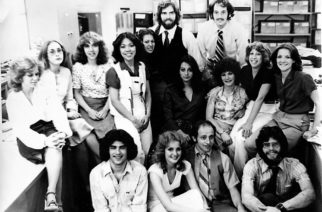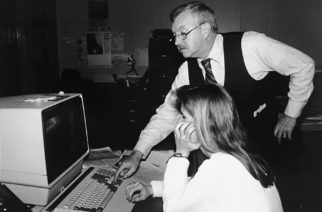I wish I could say I was cut out for The Legislative Gazette from day one. The truth is, the first month almost seemed like a recurring nightmare. Every time I drove up to Albany I nearly got lost, and I was terrible at finding my way to a convenient parking spot. On top of that, my knowledge of journalism was limited — as in I had only taken journalism one and media ethics at SUNY New Paltz.
Think of something you’ve written beforehand. What were its strengths? How could it have been improved? Similar to an item constructed with drills, hammers and wrenches, a well-written story is created through the tools accessible to the writer. If you have a drill or a wrench, your final product will be more stable and harder to deconstruct. However, the nails embedded by the hammer can be taken out almost as easily as they could be put in. That’s what working with James Gormley, editor of the Gazette, was like.
Beyond nervous from the first time I met him, every ounce of me believed I was going to disappoint Gormley. That first semester at the Gazette seemed like it was only about Gormley nearly deconstructing every story I wrote, and then working to build up a stronger narrative. Nonetheless, I carried on and figured it could get only get better. To my surprise, it did.
As the semester progressed I received less and less constructive criticism from Gormley, and that terrified me because I had come to expect it. I never made any comment about it, I just kept working harder because I was afraid of becoming complacent with my reporting. Finally – after a story I reported on from events of election night – I asked Gormley, “What needed changing? I looked over the draft I sent you again, and it doesn’t seem like anything had really changed in the published copy.”
To which Gormley replied, “I didn’t change much, not anything worth remembering specifically. Nice work, it was very well-written!” Needless to say I was shocked, because that was the first time I realized that I might have a future in reporting after all.
The next semester I came back to the Gazette, but this time it was for my major. I actually had taken The Legislative Gazette internship for my journalism minor, but after discussing further opportunities with Gormley, we decided we would make it work for my Digital Media Production major. After talking to the internship director, we decided that we were going to bring video to the Gazette – and it worked.
That spring semester involved a nice mixture of responsibilities at the Gazette. Not only was I helping start a new video practice, but Gormley made me one of his assistant editors. Delighted by the challenge, I began to arrive most days about an hour earlier than most of the other Gazetteers. I didn’t always get the stories I was interested in, but I did receive more opportunities to report – and that was all I needed.
The rest of the semester played out heavily in my favor. Gormley actually nominated me for an internship award for excellence in the Journalism Department, and I won. He told me I was one of the hardest working interns he’s ever had, and I had actually landed my first professional job as a reporter in June of 2017 because my current employer saw the work I had done for the Gazette.
If I could stress one point to either future Gazetters or readers, it would be that none of us should be afraid to do what looks challenging – regardless of our skillset. Don’t be afraid that you might not have what it takes to be successful, because working hard includes learning the skills needed. The Legislative Gazette taught me that if you can’t be the sharpest tool in the shed, be the hammer. Cheers to another 40 years!










